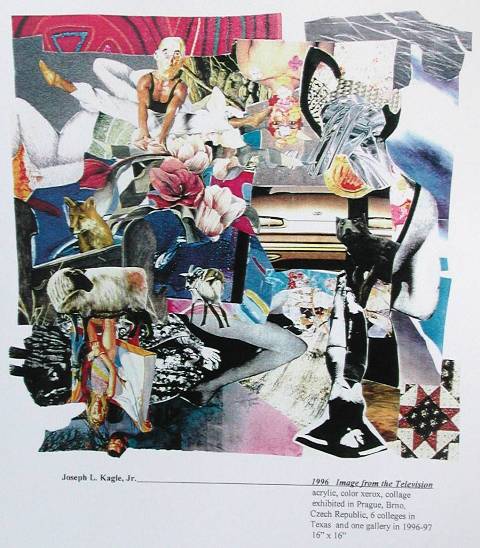 |
| HOME | GLOBAL | DISTRICTS | CLUBS | MISSING HISTORIES | PAUL HARRIS | PEACE |
| PRESIDENTS | CONVENTIONS | POST YOUR HISTORY | WOMEN | FOUNDATION | COMMENTS | PHILOSOPHY |
| SEARCH | SUBSCRIPTIONS | JOIN RGHF | EXPLORE RGHF | RGHF QUIZ | RGHF MISSION | |
|
|
|
Joseph L. Kagle, Jr. Peace Essays
|
|
How do we learn anything today? How do we sell what we have to offer? The answer is commercials. In a world of speed, instant gratification and fast food, we must learn all we need to know about the world in 15 second spots. Andy Warhol gave each of us thirty minutes of fame but it is shorter since he died. We learn about the world in the shortest of moments. Art museums have done studies determining that a viewer only stands before a work for a maximum of 60 seconds and then moves on. If we can add humor to the “sell-job”, so much the better. Do we sell the world on peace this way? Who knows? Well, Doc, After a Week I was Seeing in 15-Second Spots TV commercials serve as windows to our world
HOUSTON — PBS and the Discovery Channel may protest, but the most instructional things on the boob tube are commercials.
Yes, there's a difference between instructive and illuminative.
However, to instruct myself recently, and to challenge my creative side, I watched a week's worth of commercials. The things a person does for art's sake.
One thing I came to understand: TV touches emotions first and minds last. That's why, since Kennedy and Nixon, TV has been fundamental to getting into office and staying there. And countless product brands could use the same analogy.
The appeals are many, but a few themes emerge: nationalism, regionalism, gender issues, friendship, family, love and sex (not to be confused with each other), religious and moral issues, commonly known wisdom, hygiene and appearance.
Did I say instructive?
One of the first commercials that really struck a chord with consumers was from Britain in the 1950s that instructed how to brush one's teeth: "Up and down and round the gums. It's tingling fresh. It's fresh as ice. It's Gibbs SR Toothpaste." We see a variation in a modern-day commercial instructing how to "swish" that Listerine in one's mouth.
Another shows two middle America married-couple pushing the Listerine from one to the other, afraid to try it because it might sting the gums, until their son comes in and becomes the real parent, saying: "You guys should really grow up."
Science of branding
Much of advertising is about selling feelings. Len's Crafters advertises "happiness guaranteed." Fisher Price advises, "In side every kid is a star." Gender roles? Females must learn that "If you are a woman like me," you must take Actonel. "Men should act like men, and light beer should taste like beer" advises one brand I can't recall.
Meanwhile, an apparent appeal to males sweeps us up into the world of car chases and violent shoot-outs so that we can "live instantly with MSN Messenger."
In the 1949 film Knock on Any Door, the motto of the rebel was born: "Live fast, die young and have a good-looking corpse.” Now we get that message in 15- and 30-second bites. Judging by tube boobery, instant gratification is really what life is all about.
As an artist I was fascinated how one commercial touted a classically Greek body as it said, "Don't wait to get started on your new life." How? Not by diet or exercise but by gastric banding.
Oh, and ladies, "every kiss begins with Kay." Did you not know that? And "just one moment can change everything" if you invest heavily in Foley's fragrance counter.
OK, some commercials are educational in the extreme. Take the one that flows through art forms, from the expressionist Van Gogh to the pointillist Seurat, before blending into sea scenes of boats done German or French cubists. Only problem with this commercial: I forget the product, (It had something to do with water.)
Rest assured, transcendent lessons can be learned from commercials whose products you remember. Take the one with the pacifist monk who rescues creatures like an overturned turtle and a spider that needs to be placed again on a leaf. The monk then blows his nose on a Kleenex. Instantly, he realizes that he has murdered millions of bacteria in his thoughtless act. "Thank goodness for forgiveness," the commercial says. "Thank goodness for Kleenex tissue."
And thank goodness for a little levity.
|
| RGHF peace historian Joseph L. Kagle, Jr., 30 August 2006 |
